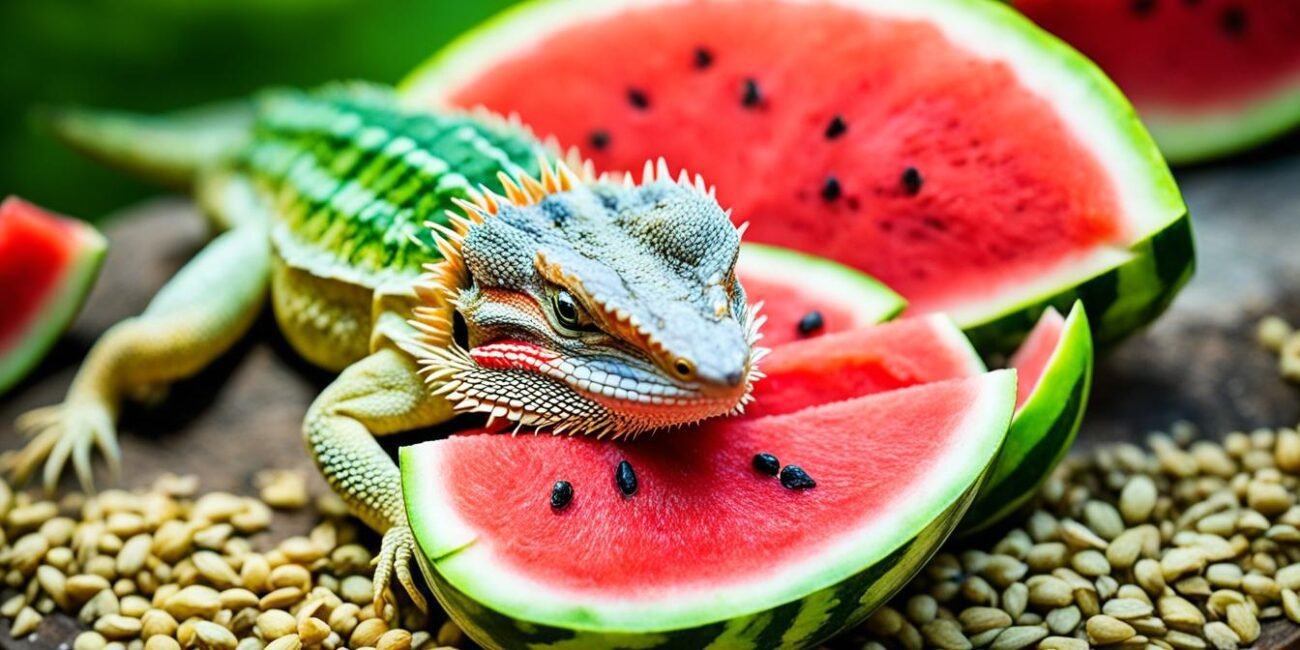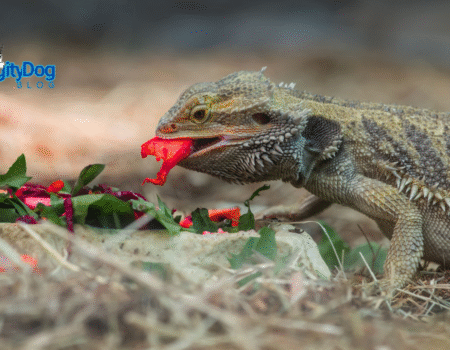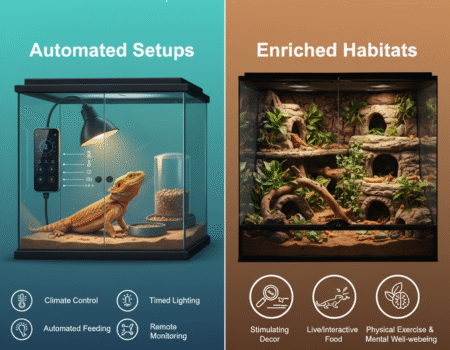Let food be thy medicine and medicine be thy food.” – Hippocrates
When it comes to feeding our beloved bearded dragons, it’s essential to provide them with a balanced and nutritious diet. Many pet owners wonder if watermelon, with its juicy sweetness, is a suitable option for their scaly friends. While watermelon can be offered to bearded dragons as an occasional treat, it’s important to understand the limitations and potential risks involved.
Watermelon is undoubtedly a refreshing summertime treat for humans, but what about our reptilian companions? Let’s delve deeper into whether bearded dragons can safely enjoy watermelon, how often it should be included in their diet, and the potential dangers of overindulgence.
Key Takeaways:
- Watermelon can be fed to bearded dragons as an occasional treat, but it should not be a regular part of their diet.
- Feeding too much watermelon to bearded dragons can lead to sugar-related health concerns and digestive issues.
- It is important to carefully prepare watermelon for bearded dragons, removing all seeds and serving only the soft pink flesh.
- Other fruits, such as apples, cantaloupe, and mango, can be included more regularly in a bearded dragon’s diet.
- A balanced and varied diet, including both protein and plant-based foods, is crucial for the overall health of bearded dragons.
How Often Can Bearded Dragons Eat Watermelon?
Feeding watermelon to bearded dragons should be done in moderation to ensure their health and well-being. While watermelon can be a tasty treat for these reptiles, it should not be included as a regular part of their diet due to its low nutrient content. So, how often can bearded dragons indulge in this juicy fruit?
Bearded dragons can eat a few small pieces of watermelon once a month or less frequently. Due to the high water content and low nutrient value of watermelon, it is important to regulate their intake. Feeding too much watermelon can lead to sugar-related health concerns, calcium depletion, and digestive issues. It is essential to prioritize a balanced diet that meets all their nutritional needs.
“Feeding watermelon to bearded dragons should be done in moderation to ensure their health and well-being.”
By limiting watermelon consumption, bearded dragons can enjoy its natural sweetness as an occasional treat. This approach helps prevent any potential health issues associated with overindulgence in this fruit. It is important to consider the age, size, and overall health of your bearded dragon when determining the frequency of watermelon feeding.
Benefits of Occasional Watermelon Treats
While watermelon doesn’t offer significant nutritional value, it can still provide some benefits when given in moderation. Watermelon is primarily composed of water, which can help keep your bearded dragon hydrated, especially during hot weather or if they are experiencing dehydration for any other reason.
Watermelon also contains vitamins C and beta carotene, as well as minerals like magnesium and potassium, which can contribute to their overall well-being. Furthermore, the sweetness of watermelon can act as a natural treat, offering some variety to their diet.
| Frequency of Watermelon Feeding | Recommended Portion Size |
|---|---|
| Once a month or less frequently | A few small pieces (around 1-2 teaspoons) |
Remember, watermelon should not replace the staples of a bearded dragon’s diet, such as insects and leafy greens. It is crucial to prioritize balanced nutrition to ensure their overall health and longevity.
Why Can’t Bearded Dragons Have Watermelon Every Day?
Feeding watermelon to bearded dragons every day can pose various dangers and potential health risks. While watermelon may seem like a tasty treat for these reptiles, excessive consumption can lead to serious consequences.
Dangers of Feeding Watermelon to Bearded Dragons
Bearded dragons are susceptible to the risks associated with consuming watermelon in large quantities. The high sugar content in watermelon can lead to several health issues, including:
- Obesity: Regular consumption of watermelon can contribute to weight gain in bearded dragons, as excess sugar can be stored as fat.
- Liver Problems: The liver of bearded dragons may struggle to process the high sugar levels found in watermelon, potentially leading to liver damage.
- Diabetes: Continuous ingestion of sugary fruits like watermelon can increase the risk of developing diabetes in bearded dragons.
- Tooth and Gum Decay: The natural sugars present in watermelon can cause dental problems, including decay and gum disease.
In addition to the sugar-related health concerns, frequent consumption of watermelon can also result in calcium depletion and digestive issues. Bearded dragons require a balanced diet that includes appropriate levels of calcium to support their bone health. Excessive watermelon intake can interfere with the absorption of calcium, leading to metabolic bone disease (MBD).
Metabolic bone disease is a serious condition that can cause deformities, weak bones, fractures, and ultimately, fatality if left untreated. Therefore, it is crucial to limit the amount of watermelon given to bearded dragons to reduce the risks of developing these health problems.
Furthermore, excessive watermelon consumption can lead to digestive issues and dehydration in bearded dragons. The high water content in watermelon can have a laxative effect, causing diarrhea and discomfort. Additionally, watermelon’s diuretic properties can contribute to dehydration if not balanced with sufficient access to fresh water.
Overall, offering watermelon to your bearded dragon as an occasional treat is fine, but providing it every day can have detrimental effects on their health. It is important to prioritize a well-rounded, balanced diet that meets their nutritional needs and minimizes potential risks.
“Feeding watermelon to bearded dragons every day can be dangerous and even deadly.”
How Can Bearded Dragons Eat Watermelon?
When it comes to feeding watermelon to your bearded dragons, it’s crucial to follow safe practices and ensure that they can enjoy this treat without any potential risks. Here are some essential tips for safely incorporating watermelon into your bearded dragon’s diet:
1. Removing Seeds from Watermelon
Bearded dragons should never consume watermelon seeds as they pose a choking hazard and can cause digestive blockages. Take the time to carefully remove all seeds from the watermelon before offering it to your dragons, ensuring their safety and well-being.
2. Preparing Watermelon in Small Portions
When offering watermelon to your bearded dragons, it’s best to slice it into small, bite-sized pieces. This makes it easier for them to eat and minimizes the risk of overconsumption. Remember to only serve the soft, dark pink flesh of the watermelon, as the rind and white parts can be difficult for dragons to digest.
3. Suitable Portion Sizes
While watermelon can be a refreshing treat for your bearded dragons, it should be given in moderation due to its low nutrient content. Offering watermelon as an occasional treat, rather than a regular part of their diet, is key to maintaining their overall health. A suitable portion size of watermelon for bearded dragons is only a few small pieces once a month or less frequently.
4. Using Watermelon as a Vegetable Enticement
While watermelon is a sweet treat for your bearded dragons, it’s important to ensure they maintain a balanced diet that includes a variety of vegetables. You can use watermelon as a way to entice picky eaters to try their greens. Place a small piece of watermelon next to the vegetables in their food bowl, encouraging them to explore and consume a more nutritious diet.
“Feeding watermelon to bearded dragons requires caution and careful preparation to avoid potential health risks.”
By following these safe feeding tips, you can ensure that your bearded dragons can enjoy watermelon as a occasional treat without compromising their health. Keeping their portion sizes in check, removing seeds, and using watermelon as a vegetable enticement will help maintain a balanced and nutritious diet for your reptile companions.
| Feeding Tips for Watermelon | Benefits |
|---|---|
| Remove all seeds | Prevents choking hazard and digestive blockages |
| Slice into small, bite-sized pieces | Easier consumption and digestion |
| Offer in moderation | Prevents overconsumption of sugar and maintains a balanced diet |
| Use as a vegetable enticement | Encourages consumption of nutritious greens |
What Fruits Can Bearded Dragons Have More Often Than Watermelon?
While watermelon should only be given to bearded dragons as an occasional treat, there are several other fruits that can be included more regularly in their diet. These safe and nutritious options provide a variety of nutrients and can be part of a balanced diet for bearded dragons.
- Apples: Apples are a great choice for bearded dragons. They are high in fiber, vitamins A and C, and provide a good amount of hydration.
- Cantaloupe: Cantaloupe is another fruit that bearded dragons can enjoy. It is rich in vitamins A and C, as well as beta carotene, which supports eye health.
- Figs: Figs are a tasty and nutritious treat for bearded dragons. They are packed with vitamins and minerals, including calcium, which is essential for healthy bones.
- Mango: Mango is a delicious fruit that bearded dragons can eat in moderation. It is a good source of vitamins A and C, and adds variety to their diet.
- Papaya: Papaya is a tropical fruit that can be included in a bearded dragon’s diet. It contains digestive enzymes and provides vitamins A and C.
Remember to always wash fruits thoroughly before feeding them to your bearded dragon. Additionally, it is essential to offer a balanced diet that includes a variety of protein and plant-based foods to meet their nutritional needs.
Note: A table showcasing the nutritional value of different fruits compared to watermelon would be a valuable addition to this section. However, without specific data, it is not possible to create a complete and informative table.
Is Watermelon Good for Bearded Dragons?
When it comes to the nutritional value of watermelon for bearded dragons, it’s important to note that watermelon is not particularly dense in nutrients for these reptiles. The majority of watermelon is composed of water, making it a hydrating fruit for bearded dragons. However, it does contain some beneficial vitamins and minerals that can contribute to their overall health.
Watermelon is a good source of vitamin C, which is essential for the immune system and can support the overall well-being of bearded dragons. Additionally, it contains beta carotene, a precursor to vitamin A, which is important for vision and skin health. Bearded dragons can also benefit from the magnesium and potassium found in watermelon, which contribute to proper muscle and nerve function.
While watermelon can provide hydration and taste enjoyment for bearded dragons, it should be considered a treat rather than a staple part of their diet. It is low in other essential nutrients, such as protein and calcium, which are necessary for their growth and overall health.
| Nutrients in Watermelon | Amount |
|---|---|
| Vitamin C | 5.8 mg per 100g |
| Beta Carotene | 77 µg per 100g |
| Magnesium | 10 mg per 100g |
| Potassium | 112 mg per 100g |
It is important to remember that a balanced diet is crucial for bearded dragons, and watermelon should be given as an occasional treat in small amounts. Providing a variety of other fruits, vegetables, and protein sources is essential to meet their nutritional needs and ensure their long-term health.
Benefits of Watermelon for Bearded Dragons:
- Provides hydration
- Contains vitamin C for immune support
- Rich in beta carotene for vision and skin health
- Good source of magnesium and potassium for muscle and nerve function
Remember to always consult with a reptile veterinarian or herpetologist to determine the best diet and feeding practices for your bearded dragon.
How Often Can Bearded Dragons Eat Watermelon?
Feeding watermelon to bearded dragons should be done in moderation. Watermelon is not a staple food for these reptiles and should be considered as an occasional treat. The recommended intake of watermelon for bearded dragons is limited to one to three teaspoon-sized pieces per month. Overfeeding watermelon can lead to various health issues and should be avoided to keep your bearded dragon in optimal health.
While watermelon may be enjoyed by bearded dragons due to its sweet taste and high water content, it lacks significant nutritional value. Feeding too much watermelon can lead to hyperglycemia, a condition characterized by high blood sugar levels, and hypocalcemia, which is calcium deficiency. These health issues can result in diarrhea, digestive problems, and chronic protein disease.
To maintain a balanced diet for your bearded dragon, it is important to offer a variety of food options that cater to their nutritional needs. While watermelon can be given as a treat, it should not make up a significant portion of their diet. Instead, focus on providing staple foods that are rich in nutrients and promote overall well-being.
It is essential to prioritize the long-term health of your bearded dragon by offering a diverse and balanced diet, rather than relying on watermelon as a primary source of sustenance.
In conclusion, while bearded dragons can enjoy watermelon, it should be offered sparingly to prevent potential health risks associated with excessive consumption. Be sure to follow the recommended intake and monitor your dragon’s overall diet to ensure proper nutrition. By doing so, you can provide a healthy and fulfilling life for your beloved reptile companion.
References:
- Watermelon for Bearded Dragons: Is It Safe?” Reptile Guide, www.reptile.guide/watermelon-for-bearded-dragons/
- “Feeding Bearded Dragons.” The Spruce Pets, www.thesprucepets.com/feeding-bearded-dragons-1239936
- “Watermelon for Bearded Dragons.” Bearded Dragon Care 101, www.beardeddragon101.com/watermelon-for-bearded-dragons.html
Stay tuned for the next section, where we will explore the different methods to feed watermelons to your bearded dragon.
How To Feed Watermelons To Your Bearded Dragon
When it comes to feeding watermelon to your bearded dragon, it’s essential to follow safe methods and preparation tips. Here’s a step-by-step guide on how to ensure your dragon enjoys this juicy treat:
- Choose a ripe watermelon: Select a watermelon that’s ripe and sweet. Avoid fruits that are overripe or have soft spots.
- Remove all seeds: Watermelon seeds can be a choking hazard for your bearded dragon and cause digestive blockages. Carefully remove all seeds before serving.
- Slice into small pieces: Slice the watermelon into small, bite-sized pieces that are easy for your dragon to eat. Ensure that the pieces are large enough to prevent them from being swallowed whole.
- Give only the pink flesh: Bearded dragons should only consume the pink flesh of the watermelon. The green rind and white parts should be discarded, as they can be difficult to chew and cause digestive issues.
- Serve alone or mix with other foods: You can offer the watermelon pieces alone or mix them with other fruits or vegetables in your dragon’s food bowl. Remember to maintain a balanced diet by including a variety of foods.
Feeding watermelon to your bearded dragon can be a delightful treat, but it’s important to exercise caution and moderation. By following these safe methods and preparation tips, you’ll ensure that your dragon enjoys this refreshing fruit without any health risks.
Can Bearded Dragons Eat Watermelon Seeds?
When it comes to feeding watermelon to bearded dragons, it is crucial to pay attention to the seeds. Bearded dragons should never eat watermelon seeds as they pose several risks to their health. Here are the dangers of watermelon seeds for bearded dragons:
- Choking Hazard: Watermelon seeds can pose a choking hazard for bearded dragons, especially if they accidentally swallow them whole. Their small size and smooth texture make them easy to get stuck in their throat or digestive tract, leading to potentially life-threatening situations.
- Digestive Blockages: If bearded dragons consume watermelon seeds, there is a high risk of digestive blockages. The seeds can obstruct the digestive system, preventing the proper passage of food and causing severe discomfort, pain, and malnutrition for the dragons.
To ensure the safety of your bearded dragon, it is crucial to remove all seeds from watermelon before feeding it to them. This includes both black and white seeds. By carefully preparing the watermelon and eliminating the seeds, you can help prevent any potential harm to your reptile companion.
Remember, the well-being of your bearded dragon should always be the top priority. By being vigilant and cautious about their diet, you can provide them with a safe and healthy environment to thrive in.
What About the Rind?
When it comes to feeding watermelon to bearded dragons, it is important to prioritize their safety and digestive health. The rind of a watermelon is not suitable for bearded dragons and should be avoided in their diet. Feeding watermelon rind to bearded dragons can pose several dangers and risks.
The rind of a watermelon is tough and difficult for bearded dragons to chew and digest. It can cause digestive issues and potentially lead to impaction, where the rind becomes stuck in the digestive tract. This can be a serious and painful condition for bearded dragons, requiring veterinary intervention to resolve.
To ensure the well-being of your bearded dragon, it is crucial to remove all green and white parts of the watermelon, including the rind, before feeding them the pink flesh. By doing so, you can avoid the potential dangers and risks associated with feeding watermelon rind to bearded dragons.
Remember, providing a balanced and appropriate diet is vital for the overall health and longevity of your pet. While watermelon can be enjoyed as an occasional treat, it is crucial to prioritize more nutritious food options for the well-being of your bearded dragon.
Dangers and Risks of Feeding Watermelon Rind to Bearded Dragons
| Dangers | Risks |
|---|---|
| Difficulty in chewing and digestion | Impaction in the digestive tract |
Feeding watermelon rind to bearded dragons can lead to serious health issues. By removing the rind and providing only the pink flesh, you can ensure the safety and well-being of your beloved reptile.
Maintaining A Balanced Diet For Bearded Dragons
Providing a balanced diet is crucial for the overall health and well-being of your bearded dragon. As reptiles with specific nutritional needs, it is important to understand the importance of a varied and balanced diet for their optimal growth and development.
Bearded dragons require a combination of protein and plant-based foods in their diet. This is particularly important during different stages of their life. Younger dragons have higher protein requirements and should consume a higher proportion of insects, such as crickets and mealworms. As they grow older, the emphasis should shift towards a more plant-based diet, incorporating a variety of vegetables and leafy greens.
Feeding guidelines for bearded dragons suggest offering staple foods that are rich in essential nutrients. This includes a variety of vegetables like collard greens, mustard greens, and butternut squash. These vegetables provide essential vitamins, minerals, and fiber that support their growth and overall health.
Additionally, it is essential to monitor the intake of calcium and phosphorous in their diet. A proper calcium to phosphorus ratio helps in preventing metabolic bone disease (MBD), a common ailment in bearded dragons. Calcium-rich food sources, such as dark leafy greens and calcium supplements, should be a part of their regular diet.
To ensure your bearded dragon’s nutritional needs are met, you can follow this simple feeding guideline:
- 70% of the diet should consist of vegetables and leafy greens
- 20% should be dedicated to protein-rich foods like insects
- 10% can be given as fruits as occasional treats
Remember to introduce new foods gradually to monitor any adverse reactions. It’s also essential to provide fresh water at all times. However, bearded dragons may obtain most of their hydration needs from the food they consume.
By maintaining a balanced diet, you are ensuring that your bearded dragon receives all the necessary nutrients for a healthy and happy life.
Recommended Foods for Bearded Dragons
| Food Type | Examples |
|---|---|
| Protein | Insects (such as crickets, mealworms, and silkworms), pinkie mice |
| Vegetables | Collard greens, mustard greens, butternut squash, bell peppers, carrots |
| Leafy Greens | Kale, dandelion greens, bok choy, turnip greens |
| Herbs | Parsley, cilantro, basil, rosemary, thyme |
| Fruits (Occasional Treats) | Papaya, mango, strawberries, blueberries |
Conclusion
After careful analysis, it can be concluded that watermelon should only be fed to bearded dragons as an occasional treat. While watermelon does contain some vitamins and minerals, its low nutrient content and high water content make it less suitable as a staple part of their diet. Overfeeding watermelon can lead to various health issues, including obesity, diabetes, calcium depletion, and digestive problems.
When feeding watermelon to bearded dragons, it is essential to practice safe feeding habits. This includes removing all seeds and the rind, as they can pose a choking hazard and cause digestive blockages. It is also crucial to provide suitable portion sizes and avoid overindulging their taste for the sweet fruit.
A balanced diet for bearded dragons should consist of a variety of foods, including both protein and plant-based options. In addition to occasional treats like watermelon, bearded dragons can enjoy other fruits such as apples, cantaloupe, figs, mango, and papaya. A well-rounded diet will ensure they receive all the necessary nutrients for optimal health and well-being.
FAQ
Can bearded dragons safely enjoy watermelon?
Bearded dragons can eat watermelon rarely, as a treat. It is not very nutrient-dense for dragons, so it should be given in small amounts. However, too much watermelon can lead to sugar-related health concerns, calcium depletion, and digestive issues.
How often can bearded dragons eat watermelon?
Bearded dragons can eat a few small pieces of watermelon once a month or less frequently. It is important to regulate their intake of watermelon due to its low nutrient content and potential health risks.
Why can’t bearded dragons have watermelon every day?
Feeding watermelon to bearded dragons every day can be dangerous and even deadly. Too much watermelon can result in sugar-related health concerns, calcium depletion, and digestive issues.
How can bearded dragons eat watermelon?
When feeding watermelon to bearded dragons, it is important to remove all seeds, as they can be a choking hazard and cause digestive blockages. Only the soft, dark pink flesh of watermelon should be given to the dragons. It is recommended to slice the watermelon into small pieces and place them in the dragon’s food bowl.
What fruits can bearded dragons have more often than watermelon?
While watermelon should be given to bearded dragons only as an occasional treat, some safe options for regular feeding include apples, cantaloupe, figs, mango, and papaya.
Is watermelon good for bearded dragons?
Watermelon is not particularly nutritionally dense for bearded dragons, as it mainly consists of water. However, it does contain some beneficial vitamins and minerals. It can provide hydration and taste enjoyment but should be considered a treat rather than a staple part of their diet.
How often can bearded dragons eat watermelon?
Bearded dragons should be given watermelon as an occasional treat, not as a regular part of their diet. At most, one to three teaspoon-sized pieces of watermelon can be given to a bearded dragon in a month.
How to feed watermelons to your bearded dragon?
When feeding watermelon to bearded dragons, it is important to choose a ripe melon and remove all seeds. The watermelon should be sliced into small pieces, and only the pink flesh should be given to the dragons. It can be served alone or mixed with other fruits or vegetables in the dragon’s food bowl.
Can bearded dragons eat watermelon seeds?
Bearded dragons should never eat watermelon seeds as they can be a choking hazard and cause digestive blockages. It is essential to remove all seeds from watermelon before feeding it to bearded dragons, including both black and white seeds.
What about the rind?
Watermelon rinds should not be fed to bearded dragons as they are difficult to chew and can cause digestive issues and impaction. It is important to remove all green and white parts of the watermelon, including the rind, before feeding the pink flesh to bearded dragons.
Maintaining a balanced diet for bearded dragons
Bearded dragons require a balanced diet that includes both protein and plant-based foods. It is important to provide a variety of staple foods and monitor their intake to ensure they are receiving all necessary nutrients.
Conclusion
Feeding watermelon to bearded dragons should be limited to occasional treats due to its low nutrient content. It is important to follow safe feeding practices, including removing seeds and rind, and providing suitable portion sizes. A balanced diet for bearded dragons should consist of a variety of foods, including protein and plant-based options.










No Comment! Be the first one.